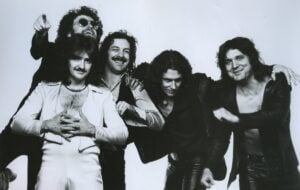Heart’s Dreamboat Annie: How Two Sisters Changed Rock Forever

via Rock Jams / YouTube
Winter 1975, somewhere in the U.S. heartland. Ann and Nancy Wilson sit in the back of a rental car, passing flat, gray landscapes dotted with truck-stop diners and gas stations. Driving is Shelly Siegel, their satin-jacketed promo man from Vancouver’s Mushroom Records.
Earlier that year, Mushroom Records had released Heart’s debut album, Dreamboat Annie. Canadian radio was giving airplay to singles like Crazy On You and Magic Man, and the band had already sold 30,000 copies. But success in the U.S. didn’t come easily.
“We had to physically go to the radio stations, Coal Miners Daughter-style,” Ann recalls. “Shelly would drive us from town to town—Cleveland, Detroit, Buffalo.”
Nancy adds:
“We’d get gussied up: ‘Hey, meet the pretty girls, here’s the record, play it, and let’s see if any phones light up!’ Then Shelly would say: ‘Okay, girls, go sit in the car, I’ll be out in half an hour.’”
This payola-style hustle worked. Radio play led to opening slots for Rod Stewart, ELO, and ZZ Top. After ten months of relentless touring and promotion, Dreamboat Annie went gold and soon platinum in both Canada and the U.S.
From Seattle Roots to Vancouver Dreams
Born in California and raised in Seattle, Ann and Nancy grew up surrounded by music. “Ray Charles, Peggy Lee, classical,” Ann says. The Beatles’ appearance on The Ed Sullivan Show in 1964 changed everything. Nancy remembers, “Unlike most girls, we didn’t want to marry The Beatles; we wanted to be them.”
After playing in local bands and garage shows, Ann moved to Vancouver with her boyfriend, Michael Fisher, and joined an all-male band that would become Heart. Nancy, meanwhile, honed her craft in Portland, eventually joining Ann in Vancouver. Together, they blended folk, rock, and a little Led Zeppelin influence, earning the nickname “Little Led Zeppelin.”
Crafting Dreamboat Annie
With producer Mike Flicker, the Wilsons turned Dreamboat Annie into something extraordinary. Early tracks like Crazy On You and Magic Man became immediate hits, combining sexual awakening, cultural commentary, and technical musicianship. Ballads such as How Deep It Goes and I’ll Be Your Song showed orchestral sophistication, while the title track appeared in multiple styles, from folk to breezy California pop.
Nancy recalls:
“We were ready to take on the world and be impressive and brave. Honestly, we didn’t know if we’d ever have a chance to make another record, so we thought: ‘Let’s blow the whole gamut!’”
Challenges, Controversy, and Breakthroughs
Success brought complications. Mushroom Records’ slow payments and a controversial Rolling Stone ad portraying the sisters as lesbians tested their patience. “We were really offended,” Nancy says. This tension inspired Ann to write Barracuda, one of Heart’s biggest hits.
Through lineup changes, health scares, lawsuits, and personal struggles, the Wilson sisters persevered. “Things like that will happen, but then they’ll get better, and we’ll love each other more,” Ann says.
Legacy and Reflection
In 2025, Heart is touring again, honoring their early material while celebrating their influences. “Dreamboat Annie was made before you could auto-tune or process vocals,” Ann says. “You were really out there singing and performing. That kind of training gave us the confidence to take on any stage, anywhere in the world.”
Nancy reflects:
“The album has an innocence—the sound, the production, the way Ann sings. It’s beautiful, like a flower child of an album. We were young. As we used to joke: ‘Young and unburnt!’ But beyond nostalgia, it’s proof that passion and persistence pay off.”
The Wilson sisters’ story is a testament to ambition, resilience, and artistry. Nancy adds:
“We were kids with guitars chasing a dream, and somehow, that dream is still chasing us—and we love it.”














